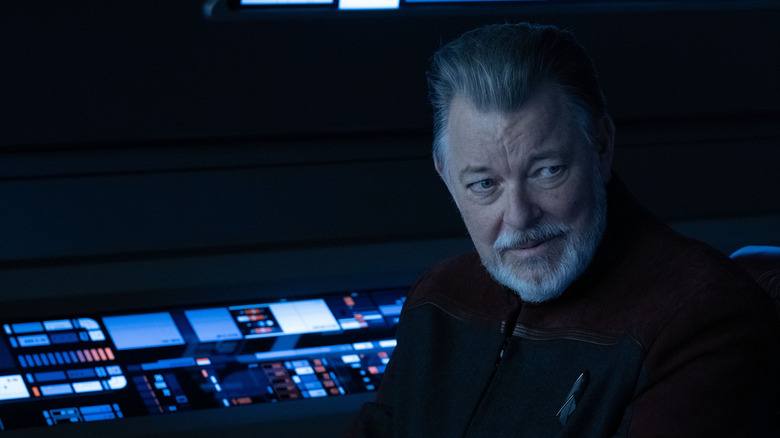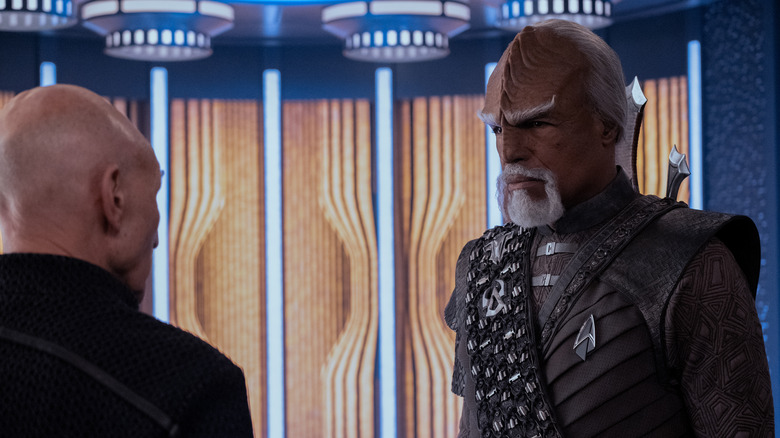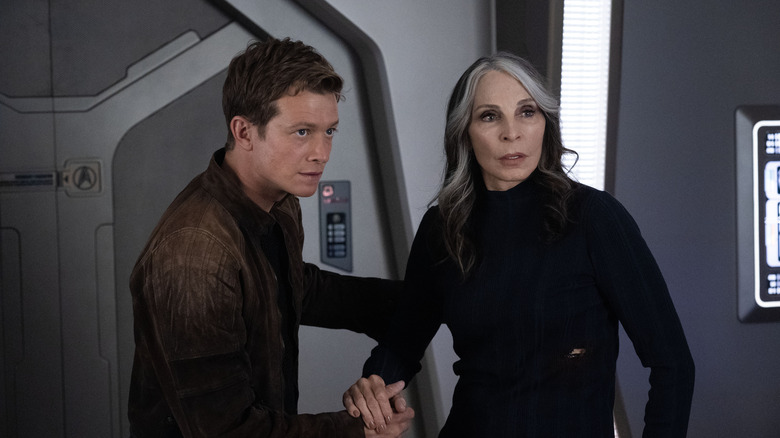Star Trek: Picard Season 3 Lets The Next Generation Crew Evolve – And That's A Good Thing
This post contains spoilers for the first four episodes of the third season of "Star Trek: Picard."
The admirable restraint on display from the makers of "Star Trek: Picard" cannot be understated. The third season of the show has been widely touted as the season wherein most of the main cast of "Star Trek: The Next Generation" would reunite for the first time since "Star Trek: Nemesis" in 2002. Because pop nostalgia remains a powerful market force, there didn't seem to be anything stopping the "Picard" showrunners from running at full speed back into familiar iconography. In a worst-case scenario, Patrick Stewart, Jonathan Frakes, Marina Sirtis, Michael Dorn, Brent Spiner, LeVar Burton, and Gates McFadden would have been put back in their old uniforms, put back on their old "Enterprise" set, and speak nothing but lines of dialogue Trekkies would be familiar with. There was every reason to believe "Picard" might have been transformed into the Paramount+ equivalent of a celebrity variety show in Branson, Missouri.
How refreshing, then, that "Picard" is four episodes in, and the entire cast hasn't even been completely gathered yet. The series has been marvelously tactful about its nostalgia value, introducing characters slowly and in a way that feels organic to the story. The new season does lean pretty heavily on recognizable music cues from old "Star Trek" movies, and its overall plot evokes feature films like "Star Trek II: The Wrath of Khan" and "Star Trek: First Contact," but these might be considered general "Star Trek" motifs more than straight-up nerd bait. From what we've seen so far, "Picard" is letting the characters grow along a logical path.
Where are they now?
According to the "Star Trek" timeline, the first season of "Picard" took place in 2399. This new season sees Picard, now over 100, living sometime in the first decade of the 2400s. "Nemesis" took place in 2379, so the characters have been out of the audience's vision for nearly 30 years. The makers of "Picard" have allowed each character to have lived out 30 years of their lives in the interim, giving them new careers, new interests, and honest-to-goodness character development. Rather than inventing conceits specifically for a story, "Picard" lets the characters and its story grow together. The characters aren't preserved in amber. They have a past.
Dr. Crusher (Gates McFadden) has undergone the most dramatic change, having become a rogue smuggler distributing medical supplies to worlds that the Federation doesn't often pay attention to. She operates her own ship with her son Jack (Ed Speleers) and is now trained in weapons. Given that Dr. Crusher was always resolutely and scrupulously moral, it makes sense that she would bend rules to abide by her own personal code of ethics. She's similar, but she's grown.
Worf (Michael Dorn) remains concerned with matters of combat and honor and has become a spy for Starfleet, engaging in under-the-radar block ops with Raffi (Michelle Hurd). In his old age, he is now a pacifist, having gained wisdom and calm. He also, is similar, but has grown. Riker (Jonathan Frakes) is an interesting case, as he was a careerist throughout "The Next Generation" and is now retired. He is just as jovial, but is far more cautious as a captain. Say it with me: He's similar, but he's grown. Even Picard himself has changed in his old age, having become more reckless and immediate.
The characters do not exist to placate fans. They are being treated with — dare I say? — respect.
Not yet seen
Geordi LaForge (LeVar Burton) is the father of three adult children — one of them is the conn officer on the U.S.S. Titan — and he, a former engineer, will be seen running a starship museum. This is an appropriate vocation for Geordi; why would he still be recalibrating phase inducers at his age anyway? As of this writing, audiences have not yet seen how Brent Spiner will be included in this season, or how the evil android Lore has been salvaged and resurrected since the events of the "TNG" episode, "Descent," in 1993. Nor have they seen Deanna Troi (Marina Sirtis) in any capacity beyond a single video phone call to Riker. Their involvement in "Picard" has yet to be revealed. Given how well the cast has been introduced so far, however, one might rest assured that their inclusion will be clever or organic.
All of this is to say that the new season of "Picard" is playing quite fairly with its characters. There are mysteries to be solved, of course, but actual solutions are being given along the way, leaving the audience feeling like actual progress is being made. Each time a "TNG" cast member enters the fray, the stakes are upped, and their expertise alters the way the story will head. After two abysmal seasons, this level of basic storytelling competence feels like a revolution.
The most negative thing that can be said about the new season of "Picard" so far is that it isn't a heady or cerebral sci-fi/ethics story like some of the better "Next Generation" episodes. But sometimes a well thought-out adventure story will do, and it's what we've had the luck to see.
If "Star Trek: Picard" showrunner Terry Matalas can stick the landing, everyone will be better off.


